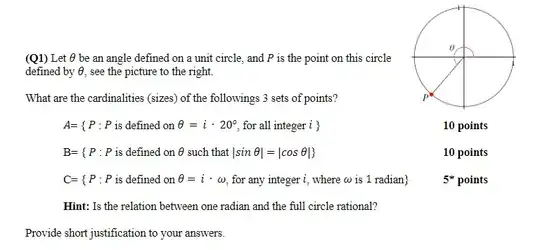I'm on a conversion MSc and haven't done math in a while, so apologies if this is an easy Q but I'm stumped. I've literally only just learned what radians and sets are- I think I've done a decent job of getting the basics of each, but I'm struggling with applying them to this problem.
Set $A, B$ are fine, but I'm pretty stumped by set $C$. I suppose the relationship $1 / 2\pi$ isn't rational, but I'm lost as to how that helps me figure out the cardinality of the set. I'm guessing that as the relationship between how many points can be drawn on the circumference isn't rational that giving the cardinality isn't as simple as giving a number?
I've got as far as sort of testing a few ideas:
- there aren't an integer number of radians in the full circle, so how can I have a finite series of points to give the cardinality?
I don't really want the answer as I'm trying to figure it out for myself, but any hints constructive to my learning would be appreciated!
